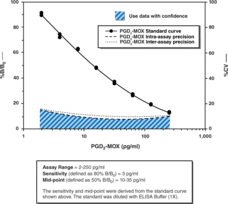Territorial Availability: Available through Bertin Technologies only in France
- Correlated keywords
- solid plates PGD2-MOX prostaglandins measures kits eias enzyme immunoassays ELISAs assays
- Product Overview:
Prostaglandin D2 (PGD2) is biosynthesized in the brain by a soluble, 26 kD glutathione-independent lipocalin-type PGD2 synthase.{1665} PGD2 accumulates in the cerebrospinal fluid (CSF), where it induces physiologic sleep in rats and humans.{1331} PGD2 is also synthesized by mast cells and leukocytes by a cellular, myeloid-type, glutathione-dependent PGD synthase. This PGD2 which is formed in the intracellular and vascular compartments is rapidly metabolized to 11?-PGF2?.{416} Thus, urinary measurements of PGD synthesis are most appropriately focused on the measurement of 11?-PGF2?. Measurement of the parent eicosanoid PGD2 is appropriate in the supernatants of cell cultures, where PGD2 levels may reach several ng/ml, and in CSF, where concentrations of several hundred pg/ml have been measured.{6647} All studies of PGD2 biosynthesis should take into consideration the chemical instability of PGD2 and its rapid degradation in the presence of serum proteins such as albumin.{1742} PGD2 also readily degrades in both acidic and basic media to give a variety of decomposition products. Similarly, antigenic protein conjugates of PGD2, synthesized for the production of antisera, show considerable amounts of decomposition. Thus, the resulting antibody response is heterogeneous with poor specificity. This makes PGD2 assay systems based on the parent compound unreliable and difficult to interpret. This PGD2-MOX ELISA is based on the conversion of PGD2 to a stable MOX derivative. Treatment of the sample with methoxylamine hydrochloride (MOX HCl) converts PGD2 into PGD2-MOX, preventing its further chemical degradation. The antiserum used in the assay was developed using conjugates of this derivative and is very specific for PGD2-MOX. The assay has been validated against stable isotope dilution GC/MS. Measurements using both techniques on identical samples showed a correlation coefficient of 0.97.
Cayman Chemical’s mission is to help make research possible by supplying scientists worldwide with the basic research tools necessary for advancing human and animal health. Our utmost commitment to healthcare researchers is to offer the highest quality products with an affordable pricing policy.
Our scientists are experts in the synthesis, purification, and characterization of biochemicals ranging from small drug-like heterocycles to complex biolipids, fatty acids, and many others. We are also highly skilled in all aspects of assay and antibody development, protein expression, crystallization, and structure determination.
Over the past thirty years, Cayman developed a deep knowledge base in lipid biochemistry, including research involving the arachidonic acid cascade, inositol phosphates, and cannabinoids. This knowledge enabled the production of reagents of exceptional quality for cancer, oxidative injury, epigenetics, neuroscience, inflammation, metabolism, and many additional lines of research.
Our organic and analytical chemists specialize in the rapid development of manufacturing processes and analytical methods to carry out clinical and commercial GMP-API production. Pre-clinical drug discovery efforts are currently underway in the areas of bone restoration and repair, muscular dystrophy, oncology, and inflammation. A separate group of Ph.D.-level scientists are dedicated to offering Hit-to-Lead Discovery and Profiling Services for epigenetic targets. Our knowledgeable chemists can be contracted to perform complete sample analysis for analytes measured by the majority of our assays. We also offer a wide range of analytical services using LC-MS/MS, HPLC, GC, and many other techniques.
Accreditations
ISO/IEC 17025:2005
ISO Guide 34:2009
Cayman is a leader in the field of emerging drugs of abuse, providing high-purity Schedule I-V Controlled Substances to federally-licensed laboratories and qualified academic research institutions for forensic analyses. We are certified by ACLASS Accreditation Services with dual accreditation to ISO/IEC 17025:2005 and ISO Guide 34:2009.





